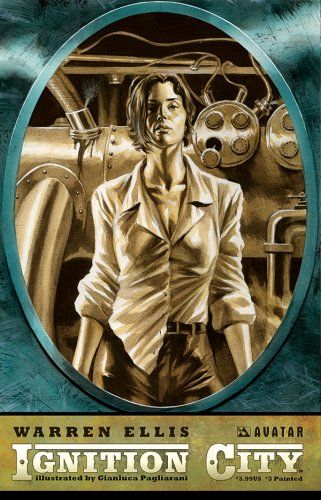The basic concept of a place where space heroes go to die could have gone in any number of directions, but Warren Ellis is doing a great job of balancing analogue characters and a new plot that exists outside of those characters, at least in part.
As Mary Raven continues to investigate the death of her father, Ellis and Pagliarani provide some more background not just on Ignition City, but on Earth's history in space through Gayle, the first woman in space and current bar owner. By delving into Gayle's past through hints and allusions, a wide tapestry of history of woven but also left open for future exploration.
One four-panel sequence over two pages showcasing Kharg the Killer is particularly well done, economically telling us everything we need to know about the character. Not just the scenes themselves, which show Kharg killing a child or walking across a landscape covered with dead, naked bodies, but in how Pagliarani depicts Kharg. The calm, collected facial expression that doesn't change no matter the situation and the stiff-yet-casual body language tell us a lot about his character without a single line of dialogue.
The small moments like that make "Ignition City" the sort of book that you could reread again and again to pick apart the details and try to imagine all of the events that are merely hinted at. Even as the story takes place, so much goes unsaid about life in Ignition City that it would take dozens of issues to properly portray what goes on there. One new character, Marshall Pomeroy, is seen only for four pages, but makes an impact with rocket suit and corrupt ways, and seems like he could fill a few issues alone.
For all of the depth of history and allusions to past adventures, Ellis makes one choice that I'm not sure is for the best (although time could tell on it). Mary reads through her father's logbook to get a sense of his life and what led to his death, but nothing from the book is related to the reader. It's such an obvious break from Ellis's usual manner of telling stories where he revels in brief glimpses into the past through journals or, at bare minimum, sharing quick excerpts.
Pagliarani has a very subtle, understated style, often only using the bare minimum of lines to draw characters, but providing great detail in settings and certain objects. No line is wasted or unnecessary, which matches Ellis's economical writing here. Every scene and line of dialogue serves a purpose (or seems to, at least). The two are a perfect match here, working very much in sync.
"Ignition City" walks the same line that "Planetary" did in providing both insight into the fictional world and characters' pasts and delivering a story with plenty of forward momentum. Like "Planetary," Ellis has chosen a mystery plot, which allows for plenty of both and it works for a very nice balance.

